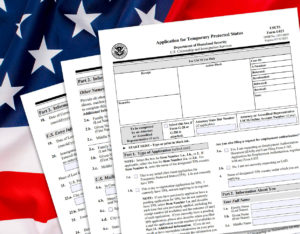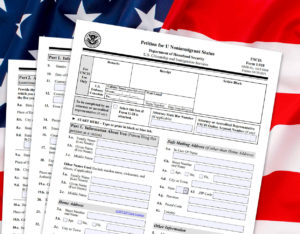Table of Contents
Family Based Green Cards
To apply for permanent residency you must have a qualifying relationship. You must qualify under one or more of the following categories:
- Child of an American or Resident;
- Parent of an American;
- Spouse of an American or Resident;
- Sibling of an American.
The type of relationship and the country of the Beneficiary (the person seeking the immigration benefit) matters greatly. This will determine if the process is to take months versus many years. A petitioner can lose their place in line, so to speak, if they become 21 or they get married. Stepchildren/parents can petition for their children/parents but there are additional requirements.
Please call our office to schedule a consultation in order to discuss which options best apply to your case.
For our Military
Members of our armed forces get favorable treatment in the following ways:
They can apply for citizenship without having to wait for the 5 year lawful permanent resident period to lapse; and they can petition for their spouses, children, and parents to obtain protection from deportation via the parole in place “PIP” program.
Both programs mentioned have additional requirements. Please call our office to schedule a consultation in order to discuss eligibility.

Temporary Protected Status (TPS)
The Secretary of Homeland Security may designate a foreign country for TPS due to conditions in the country that temporarily prevent the country’s nationals from returning safely, or in certain circumstances, where the country is unable to handle the return of its nationals adequately. USCIS may grant TPS to eligible nationals of certain countries (or parts of countries), who are already in the United States. Eligible individuals without nationality who last resided in the designated country may also be granted TPS.
The Secretary may designate a country for TPS due to the following temporary conditions in the country:
- Ongoing armed conflict (such as civil war)
- An environmental disaster (such as earthquake or hurricane), or an epidemic
- Other extraordinary and temporary conditions
During a designated period, individuals who are TPS beneficiaries or who are found preliminarily eligible for TPS upon initial review of their cases (prima facie eligible):
- Are not removable from the United States;
- Can obtain an employment authorization document (EAD); and
- May be granted travel authorization
TPS carries other requirements. For more information regarding your eligibility, please call our office in order to schedule a consultation.
Deportation Defense
The United States Government may initiate removal proceedings if there is reason to believe that you are present in the United States without authorization, or if you are in violation of your current immigrant or non-immigrant status. Some non-immigrants (e.g. visa waiver program visitors) are not entitled to full due process of law and will most likely be removed from the United States without having the opportunity to see an immigration judge. For those people entitled to full due process that are placed in removal proceedings, it is highly advisable they seek competent immigration counsel in order to explore defenses. A successful removal defense can materialize to gaining legal status in front of an immigration judge, or prevent removal to a country where the immigrant would most likely be tortured. Here is a list of the most common deportation defenses:
Family-based adjustment of status. This is a way of changing from nonimmigrant to immigrant status in order to get legal status in the United States through a family member, most likely a U.S. citizen. Usually (among other requirements), you have to have entered the U.S. legally to qualify for adjustment. But some exceptions to the legal-entry requirement are available.
Adjustment of Status for Special Immigrant Juveniles. If you are in the United States and need the protection of a juvenile court because you have been abused, abandoned or neglected by a parent, you may be eligible for Special Immigrant Juvenile (SIJ) classification. If SIJ classification is granted, you may qualify for lawful permanent residency (also known as getting a Green Card). This generous benefit can be sought in front of an immigration judge as well. Please note that in the state of Texas, generally, the SIJ petitioner must be under 18 years of age in order to seek protections from a juvenile court. Due to delays in juvenile courts, it is advisable to start this process as soon as possible.
Asylum. This is a form of protection for people who have fled persecution or fear future persecution in their home country. A grant of asylum allows legal status in the U.S., a work permit, and eventually a green card. Under the immigration nationality Act, a person is allowed to apply with the United States government for asylum protections if they have suffered persecution or fear that they will suffer persecution due to their:
- Race
- Religion
- Nationality
- Membership in a particular social group
- Political opinion
If you fear returning to your home country for any of the reasons mentioned above, or if you are unsure, please call us immediately to schedule a consultation. Please note that there is a one-year filing requirement for most seekers of asylum protections. Exceptions to this rule can include minors and people ill-advised about the one-year filing deadline by immigration officials at the time they entered the country. Again, please consult with an experienced competent attorney in order to explore your legal options.
Withholding of removal. This is asylum’s cousin. Although much like asylum in many ways, withholding is more difficult to obtain, because you have to show that it is “more likely than not” that you would be persecuted in your home country upon return. Also, it provides fewer benefits than asylum, because recipients are usually ineligible to apply for permanent residence or travel outside of the United States. However, it might be your only option if certain bars to asylum apply to you (e.g. such as waiting far too long to apply for asylum after entering the United States). A person who is granted withholding can stay in the U.S. and obtain work authorization.
Protection under the Convention Against Torture (CAT). Protection under CAT is available only if it is “more likely than not” that the government of the applicant’s home country—or some person or group the government cannot control—will torture that person. The reasons for said torture must be nefarious (unlike with an asylum case, where you must prove that the persecution is related to you fitting within one of five protected grounds–the reasons for torture are generally broad). CAT is also like withholding in that persons who receive CAT protection cannot ever get U.S. permanent residence or travel internationally. CAT recipients usually receive permission to remain and work in the United States.
Cancellation of removal for persons who are not lawful permanent residents (42B). This remedy is a way of obtaining a green card if you can prove ten years’ physical presence in the U.S., and can also show that your being removed would cause “exceptional and extremely unusual hardship” to your “qualifying relative” (a spouse, parent, or child who is a U.S. citizen or permanent resident).
Cancelation of removal for certain lawful permanent residents (42A). If you are a lawful permanent resident (LPR or green card holder) and you find yourself in removal proceedings because of a criminal conviction, you may be eligible for cancellation of removal for lawful permanent residents if you can prove the following:
- have been a lawful permanent resident of the U.S. for at least five years at the time that the application is filed
- have continuously resided in the U.S. for at least seven years after being admitted in any status and before the “stop-time rule” is triggered
- have not been convicted of an aggravated felony
- have not received cancellation of removal or 212(c) relief in the past, and
- as a matter of discretion, deserve to win your case.
Cancellation under the Violence Against Women Act (VAWA). Similar to 42B, an applicant for VAWA cancellation must show that he or she has been “battered or subjected to extreme cruelty” by a “qualifying relative” and meets other requirements, including three years of physical presence in the U.S. and good moral character.
Voluntary Departure. If all else fails, this offers a way to leave the U.S. without staining your immigration record with a past order of removal (which can make returning to the U.S. even harder). Depending on when a request for voluntary departure is made, there are certain requirements.
Deferred action. This is an agreement by the U.S. government to put your case on hold–it does not materialize in giving you legal status, but, nevertheless, it is a protection from deportation. It is applied on a case-by-case basis and has become much harder to get since the Trump election. Your attorney would need to speak with the government attorney handling your case to negotiate this relief.
Prosecutorial discretion. This is a decision by the government agency to refrain from executing your deportation or engaging in any efforts to procure an order of removal. If you receive prosecutorial discretion, you may be able to apply for work authorization but will not be eligible for other benefits such as the right to travel. Usually, persons whose cases are closed based on prosecutorial discretion do not have a criminal record, but there are no set-in-stone rules about who can receive this benefit. Like deferred action, prosecutorial discretion is harder than ever to get and must be discussed with the government attorney handling your case.
U Visa. Although not technically a form of relief in front of an immigration judge, U-Visa status (or being in the process of obtaining U-Visa status) can help prevent removal from the United States. Certain victims of crimes who are helpful in an investigation of the crime may apply for U visa status and obtain work authorization in the United States. If the U visa is approved, removal proceedings can be terminated. In many cases where removal proceedings are not terminated, the Department of Homeland Security (DHS) can nevertheless exercise discretion and refuse to execute an immigration judge’s removal order. Upon application, a U-Visa recipient can apply for a green card (LPR).
TPS and NACARA. The U.S. government designates certain countries for Temporary Protected Status or “TPS” if conditions in that country temporarily make a person’s return unsafe, or if its government is unable to sufficiently handle the return of its nationals. Similarly, individuals from certain countries — primarily Central America and Eastern Europe — who entered the U.S. before certain dates and applied for asylum or registered for certain benefits may be eligible for NACARA. Both TPS and NACARA can serve as a defense to deportation.
Immigration Bonds from Custody
If a person is detained by immigration customs enforcement (ICE) or customs border protection (CBP), there are avenues to apply for a release (bond) while the person awaits his/her removal proceedings. Both ICE and CBP can grant a parole bond or release the person under certain conditions (e.g. signature, ankle monitor, etc). If the government denies release/bond, the detained person may nevertheless have the option of filing a request for release on bond with an immigration judge (known as a motion for Bond Redetermination). The person must make a showing through a presentation at a bond hearing that he/she is not a danger to the community, is not a flight risk, has relief available, and that the judge has jurisdiction to rule on the person’s application for bond release. It is important to hire counsel expediently since bond hearings are not mandatory and immigrants will typically have only one opportunity to make their case in front of an immigration judge.
Waivers
Intending immigrants that have an adverse criminal or immigration history may find themselves inadmissible to obtain immigration benefits. However, many grounds of inadmissibility allow applicants to apply for a waiver; in other words, “forgiveness” from the U.S. government. Different grounds of inadmissibility have different waiver requirements. The application itself will need to be carefully prepared and documented. It is important to consult with a competent immigration attorney as there are some things that are not waivable. Certain serious crimes and certain immigration violations may render the person applying for immigration benefits inadmissible for a long period or permanently. This means that while an intending immigrant may receive an approval of a waiver, he/she nevertheless may find himself/herself inadmissible to the United States (if consular processing) or he/she may have triggered removal proceedings (if applying for adjustment of status while inside the United States).
Citizenship
To apply for naturalization to become a U.S. citizen, you must:
- Be at least 18 years of age at the time you file the application;
- Have been a lawful permanent resident for the past three or five years (depending on which naturalization category you are applying under);
- Have continuous residence and physical presence in the United States;
- Be able to read, write, and speak basic English;
- Demonstrate good moral character;
- Demonstrate a knowledge and understanding of U.S. history and government;
- Demonstrate a loyalty to the principles of the U.S. Constitution; and
- Be willing to take the Oath of Allegiance.
Some of these requirements do not apply for certain military service members as well as veterans. Please call our office in order to schedule a consultation.
Victim Visas, U-Visa, & VAWA
Victims of Criminal Activity: U Nonimmigrant Status
The U nonimmigrant status (U visa) is set aside for victims of certain crimes who have suffered mental or physical abuse and are helpful to law enforcement or government officials in the investigation or prosecution of criminal activity. Congress created the U nonimmigrant visa with the passage of the Victims of Trafficking and Violence Protection Act (including the Battered Immigrant Women’s Protection Act) in October 2000. The legislation was intended to strengthen the ability of law enforcement agencies to investigate and prosecute cases of domestic violence, sexual assault, trafficking of aliens and other crimes, while also protecting victims of crimes who have suffered substantial mental or physical abuse due to the crime and are willing to help law enforcement authorities in the investigation or prosecution of the criminal activity. The legislation also helps law enforcement agencies to better serve victims of crimes.
Green Card for VAWA Self-Petitioner
Under the federal Violence Against Women Act (VAWA), you may be eligible to become a lawful permanent resident (get a Green Card) if you are the victim of battery or extreme cruelty committed by:
- A U.S. citizen spouse or former spouse;
- A U.S. citizen parent;
- A U.S. citizen son or daughter;
- A lawful permanent resident (LPR) spouse or former spouse; or
- An LPR parent.
You may self-petition under VAWA by filing a Petition for Amerasian, Widow(er), or Special Immigrant (Form I-360) without your abusive family member’s knowledge or consent. A person who files a VAWA self-petition is generally known as a VAWA self-petitioner. If your self-petition is approved and you meet other eligibility requirements, you may be eligible to apply to become a lawful permanent resident. For more information, call our office to set up a discreet consultation.










